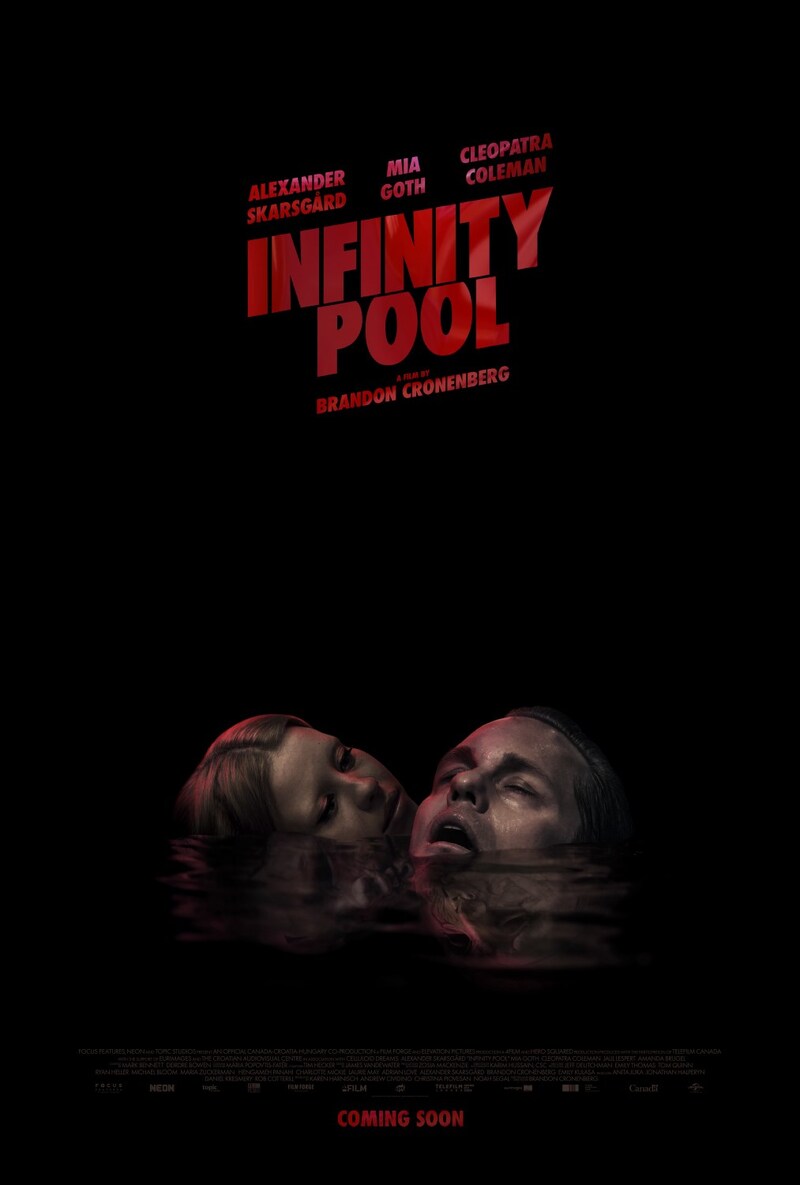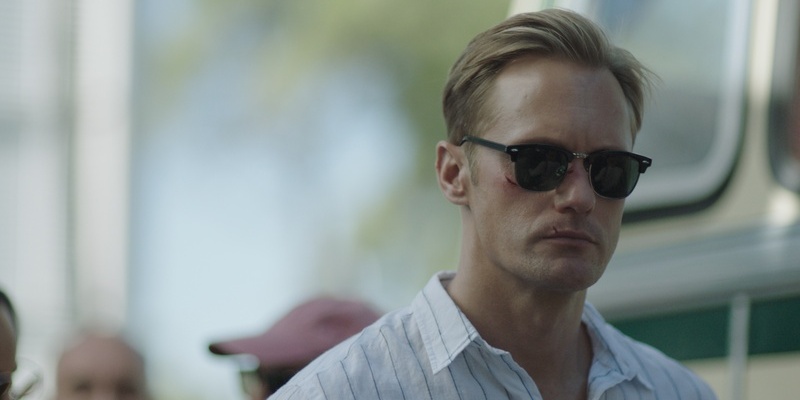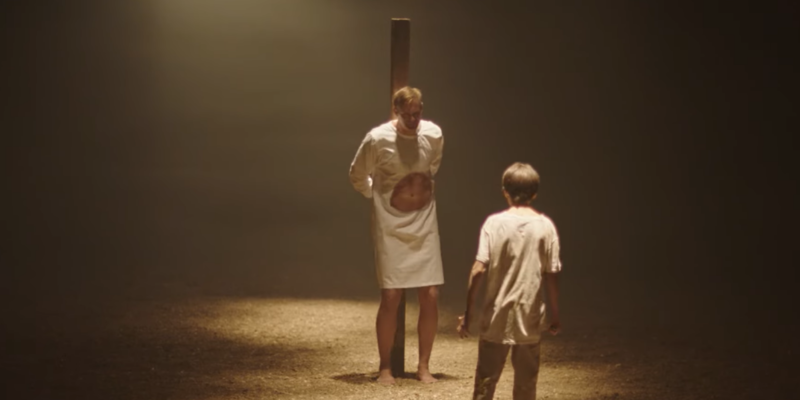
Review by
Eric Hillis
Directed by: Brandon Cronenberg
Starring: Alexander Skarsgård, Mia Goth, Cleopatra Coleman, Jalil
Lespert, Thomas Kretschmann

Have there ever been so many beneficiaries of nepotism working in the
film industry? It seems like every other actor is now the spawn of an
influential parent. Ignoring the ethics of this, it's a situation that's
gifted us with some talented performers. Rebecca Hall, Lea Seydoux and
Zoe Kravitz, to name just a few, may not have gotten their start in
movies were it not for the power wielded by their families, and cinema
would be worse off for it. Would Brandon Cronenberg be delivering
his third movie as writer/director if his father was a plumber rather
than an acclaimed auteur? Possibly not, and in Cronenberg's case it's
hard to imagine him making the movies he has if he was anyone else's
son, so similar are they in their themes and aesthetic to the work of
his old man.
Those who have benefitted from nepotism rarely address their privilege,
and it's not something interviewers are likely to bring up. But you have
to wonder if it's something they wrestle with? I was trying to think of
filmmakers that have explored this theme in their work, and the only
example that springs to mind is 1931's La Chienne. Directed by Jean Renoir, who likely wouldn't have had his career if
he hadn't been the son of one of France's most acclaimed artists, the
film is about an aspiring painter who meets a young prostitute who
claims to adore his work. His ego is continually massaged until it's
revealed that he's been cruelly played for a fool. Renoir seems to use
the film to wrestle with his insecurities over whether his work really
stands on its own.

With his third feature, Infinity Pool, Cronenberg Jnr does something similar. His surrogate is James Foster,
a writer who published a book six years ago but hasn't been able to
deliver a follow-up. Luckily for James, he married the daughter of a
publisher. Seeking inspiration, James and Em travel to a high class
resort in Li Tolqa, a fictional country that resembles a mix of Cuba and
Soviet era East Germany. It's probably not a coincidence that James is
played by another beneficiary of nepotism, Alexander Skarsgård,
son of Stellan.
As in Renoir's film, the protagonist of Cronenberg's is approached by
an attractive young woman who claims to adore his book. The young
English woman, Gabi, is played by Mia Goth, so we immediately
sense she might be up to no good. James is invited, along with his wife
Em (Cleopatra Coleman), by Gabi and her French husband Alban (Jalil Lespert) to join them on a trip away from the resort to a nearby beach. Later,
Gabi gets James alone and strokes more than just his ego, if you get
what I mean (and if you don't, Cronenberg makes it explicitly
clear).
On the drive back to the resort, James runs over and kills a local
farmer. He and Em initially want to call the police, but Gabi and Alban
convince them to keep quiet, claiming terrible things would happen if
they confessed. That night however, the cops arrive at the resort and
take James into custody. Trials aren't a thing in Li Tolqa it seems, and
it's decided that James is guilty and must face punishment. He's given
an ultimatum – he can be executed or he can be cloned and watch as his
clone is brutally murdered by a family member of his victim. James
wastes no time in opting for the latter.

The ensuing drama plays out like a member of the Cronenberg family
remaking Ruben Ostlund's
Force Majeure. Like the hapless protagonist of that Swedish satire, James is given
the cold shoulder by his wife, who is disgusted at his nonchalant
reaction to watching a perfect double of himself sliced up before his
eyes. Unable to locate his passport, James is forced to stick around as
his wife returns to the US, and he falls in with Gabi, Alban and their
group of rich sociopath friends, who make the fascists of
Salo seem like a book club. Knowing they face no real
punishment, these people revel in committing atrocities against the
locals, and James becomes swept up in their nihilistic debauchery. He's
finally found his tribe.
There's a lot to unpack in Cronenberg's densely layered film. First and
foremost it appears to be a vessel for the filmmaker to explore his
artistic insecurities. The casting of Skarsgard is inspired. Despite his
Adonis looks, he's an actor who has always portrayed a vulnerability and
insecurity, never more explicitly than here. There's a label annoying
people on the internet have recently come up with for the likes of
Cronenberg and Skarsgard – "Nepo babies" – and Cronenberg seems to
directly reference this particular insult with Gabi constantly referring
to James as a "baby" whenever it seems he might be in danger of having
an attack of moral conscience. At one of James's lowest points she even
offers him a nipple to suck on. It's not too hard to imagine Goth
whispering "Nepo baby" in Skarsgard's ear before every take.

Other themes are explored in murkier fashion. The film has something to
say about the curious tradition of wealthy westerners travelling to
troubled countries and residing in a cocoon while poverty, famine and
war rage outside the walls of a top class resort. The resort is a mish
mash of lazily rendered cultural clichés, from a Chinese restaurant to a
Bollywood dance show, allowing its guests to experience foreign cultures
without having to interact with foreigners. At the same time, the film
seems to have a muddled view on class. The decadent rich are portrayed
as sociopaths, but curiously they don’t target the poor locals but
rather those who share their high status, invading the mansion of a
wealthy landowner. Gabi and Alban have the surname Bauer, which
ironically translates from German as "peasant." Does their targeting of
fellow elites suggest a self-loathing, in keeping with the film's
overall theme of insecurity?
Unlike his father, whose metaphors and allegorical scenarios are far
more direct, Cronenberg doesn't make things easy for the viewer. Take
from it what you will is the whole of his law. I think I know what
Infinity Pool is about, but I could be wrong. One thing I
know for sure is that Cronenberg knows exactly what he's doing here. If
he is wrestling with insecurity (and what good artist doesn't?), it
isn't reflected in his work, which is as confident as that of the best
of today's genre filmmakers.

